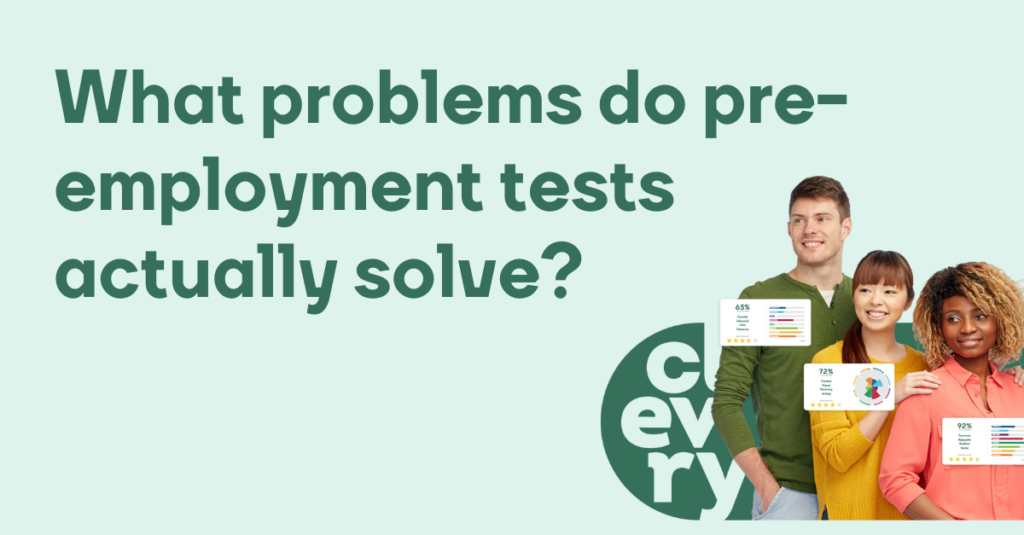As recruiters, HR professionals, and business owners, we face many challenges in finding and hiring the right talent. Pre-employment tests have emerged as a powerful tool in the hiring process, addressing several persistent issues faced by those responsible for bringing new talent into organisations.

Let’s take a look at some of the problems these tests can help solve for recruiters.
1) Evaluating skills:
One of the primary issues recruiters face is assessing candidates’ actual skill levels accurately. Resumes and interviews can only provide so much insight. Pre-employment tests allow recruiters to evaluate candidates’ skills in a practical, real-world context.
Whether it’s coding tests for software developers, case studies for consultants, or design challenges for creatives, these psychometric assessments give recruiters a tangible measure of a candidate’s abilities before they even step foot in the door for an interview. This helps ensure that candidates possess the necessary skills to excel in the role, reducing the risk of hiring mismatches.
2) Reducing bias in hiring decisions:
Bias in hiring can be a big concern. Traditional methods of evaluating candidates, such as resumes and interviews, can be susceptible to unconscious biases based on many factors, such as gender, race, or educational background.
Pre-employment tests offer a more objective way to evaluate your candidates, focusing solely on their skills and abilities rather than extraneous factors. By standardising the evaluation process, pre-employment tests help reduce bias and promote fairer hiring decisions, ultimately leading to a more diverse and inclusive workforce.
3) Streamlining the screening process:
Sorting through large volumes of applications is very time-consuming. Pre-employment tests help streamline the screening process by providing an initial filter to identify top candidates more efficiently. Instead of manually reviewing each resume, recruiters can use assessments to quickly assess candidates’ suitability based on their performance.
This saves time and resources, allowing recruiters to focus their efforts on engaging with the most promising candidates rather than sifting through piles of resumes. As a result, the recruitment process becomes more efficient, with faster time-to-hire and reduced administrative burden.
4) Identifying cultural fit:
Cultural fit can play a crucial role in determining a candidate’s long-term success within an organisation. However, it can be challenging to assess cultural fit through traditional interviews alone. Pre-employment tests provide recruiters with insights into candidates’ work styles, problem-solving approaches, and values, allowing them to gauge how well individuals align with the organisational culture.
By incorporating assessments that reflect the organisation’s values and work environment, recruiters can make better informed hiring decisions, selecting candidates who are not only skilled but also likely to thrive and contribute positively to the company culture.
5) Predicting job performance:
Recruiters are tasked with finding candidates who not only have the right skills but also possess the potential to excel in the role. Pre-employment tests can serve as predictive tools for evaluating candidates’ potential job performance.
By simulating real work scenarios or tasks relevant to the position, these assessments provide recruiters with a glimpse into how candidates might perform on the job. This predictive insight helps recruiters identify candidates who are not only technically proficient but also likely to succeed in the specific role and contribute to the organisation’s success. As a result, hiring decisions become more strategic, leading to better outcomes for both the company and the hired candidates.
6) Improving candidate experience:
The recruitment process is not only about evaluating candidates; it’s also about providing a positive experience for applicants. Pre-employment tests can contribute to a better candidate experience by offering candidates an opportunity to showcase their skills in a meaningful way.
Unlike traditional screening methods that rely solely on resumes and interviews, assessments empower candidates to demonstrate their abilities firsthand, giving them a sense of agency in the process. Additionally, well-designed assessments provide candidates with valuable feedback, regardless of whether they are ultimately hired, helping them understand their strengths and areas for improvement. By prioritising a positive candidate experience, recruiters can improve their employer brand to better attract top talent, and develop long-term relationships with candidates, even those who may not be the right fit for the current role.
In conclusion, pre-employment tests offer a range of solutions to the challenges faced by recruiters, HR professionals, and business owners in the hiring process.
From evaluating skill proficiency and reducing bias to streamlining the screening process and predicting job performance, these assessments provide valuable insights that enable more informed hiring decisions. Moreover, by identifying cultural fit and improving the overall candidate experience, pre-employment tests contribute to building stronger, more diverse, and inclusive workforces while enhancing employer brand reputation.
As recruitment continues to evolve, leveraging pre-employment tests as a strategic tool can help organisations stay competitive in attracting and retaining top talent.



